| Listing 1 - 10 of 34 | << page >> |
Sort by
|
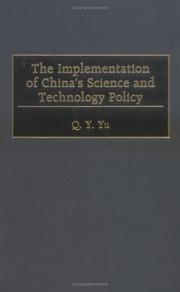
ISBN: 1567203329 0313007535 9780313007538 9781567203325 9798400668968 Year: 1999 Publisher: Westport, Conn. Quorum Books
Abstract | Keywords | Export | Availability | Bookmark
 Loading...
Loading...Choose an application
- Reference Manager
- EndNote
- RefWorks (Direct export to RefWorks)

ISBN: 0742567907 9780742567900 9780742540576 074254057X 9780742540583 0742540588 Year: 2008 Publisher: Lanham Rowman & Littlefield
Abstract | Keywords | Export | Availability | Bookmark
 Loading...
Loading...Choose an application
- Reference Manager
- EndNote
- RefWorks (Direct export to RefWorks)
After a period of self-imposed exclusion, Chinese society is in the process of a massive transformation in the name of economic progress and integration into the world economy, yet the Chinese Communist Party (CCP) is seeking to maintain its rule over China indefinitely. Examining Chinese propaganda and thought work in the current period offers readers a unique understanding of how the CCP will address real and perceived threats to stability and its continued hold on power.
Propaganda, Chinese. --- Propaganda, International. --- Chinese propaganda --- International propaganda --- International relations --- Propaganda --- World politics --- China --- Foreign relations. --- Politics and government --- S06/0900 --- S06/0438 --- China: Politics and government--Political propaganda --- China: Politics and government--Policy towards press, Internet

ISBN: 075462322X Year: 2003 Publisher: Aldershot Ashgate
Abstract | Keywords | Export | Availability | Bookmark
 Loading...
Loading...Choose an application
- Reference Manager
- EndNote
- RefWorks (Direct export to RefWorks)
S08/0520 --- S12/0820 --- S08/0820 --- S08/1100 --- S11/0731 --- S11/0730 --- S06/0438 --- S06/0437 --- Human rights --- -Human rights --- Basic rights --- Civil rights (International law) --- Rights, Human --- Rights of man --- Human security --- Transitional justice --- Truth commissions --- China: Law and legislation--Civil law, human rights: since 1949 --- China: Philosophy and Classics--Comparative philosophy --- China: Law and legislation--Administration of justice: since 1949 --- China: Law and legislation--International law --- China: Social sciences--Childhood, youth --- China: Social sciences--Women: since 1949 --- China: Politics and government--Policy towards press, Internet --- China: Politics and government--Policy towards intellectuals (incl. "thought reform", "brainwashing") --- Law and legislation
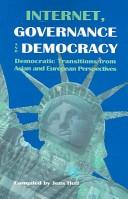
ISBN: 8776945391 9788776945398 8791114675 9788791114670 Year: 2006 Volume: 7 Publisher: Copenhagen NIAS
Abstract | Keywords | Export | Availability | Bookmark
 Loading...
Loading...Choose an application
- Reference Manager
- EndNote
- RefWorks (Direct export to RefWorks)
Sociology & Social History --- Social Sciences --- Social Change --- S10/0835 --- S06/0437 --- S06/0438 --- S06/0500 --- S08/0520 --- China: Economics, industry and commerce--Postal service and telecommunications: since 1949 (including E-commerce) --- China: Politics and government--Policy towards intellectuals (incl. "thought reform", "brainwashing") --- China: Politics and government--Policy towards press, Internet --- China: Politics and government--Other modern political movements (e.g. anarchism, Socialism, dissident movements, Beijing Spring, Tian'anmen) --- China: Law and legislation--Civil law, human rights: since 1949 --- Conferences - Meetings --- Internet --- Democratization --- Globalization --- Démocratisation --- Mondialisation --- Political aspects --- Congresses. --- Aspect politique --- Congrès --- Asia --- Denmark --- Asie --- Danemark --- Politics and government --- Politique et gouvernement
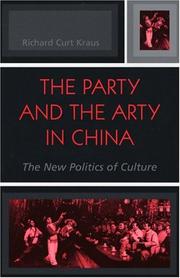
ISBN: 0742527204 0742527190 1417503564 9781417503568 9780742527195 9780742527201 Year: 2004 Volume: *1
Abstract | Keywords | Export | Availability | Bookmark
 Loading...
Loading...Choose an application
- Reference Manager
- EndNote
- RefWorks (Direct export to RefWorks)
Arguing that cultural reform is a key aspect of political reform, Richard Kraus shows here that China's economic transformation has dramatically liberated the production and consumption of culture. In this original and provocative study, Kraus offers a political analysis of Chinese culture that includes all genres of art. Surveying the evolution of China's cultural politics between 1979 and 2003, this book explores the complex relationship between money and art as exemplified by declining state arts patronage, changing standards for painting nudity, censorship, and the professionalization of a
S06/0436 --- S17/0400 --- China: Politics and government--Policy towards literature and art --- China: Art and archaeology--Chinese art: general and history --- Art and state --- Art --- Arts --- Politics and art --- State and art --- Government policy --- Art and society --- Cultural policy --- Education and state --- China

ISBN: 0786417714 Year: 2005 Publisher: Jefferson (N.C.) McFarland
Abstract | Keywords | Export | Availability | Bookmark
 Loading...
Loading...Choose an application
- Reference Manager
- EndNote
- RefWorks (Direct export to RefWorks)
S13A/0403 --- S12/0400 --- S06/0439 --- S12/0216 --- S12/0340 --- China: Religion--Rites, magic, festivals --- China: Philosophy and Classics--Kongzi 孔子 Confucius and Confucianism --- China: Politics and government--Policy towards religion --- China: Philosophy and Classics--Political philosophy --- China: Philosophy and Classics--Yili, Liji, Zhouli, Rites: general --- Confucianism and state --- State and Confucianism --- State, The --- China --- Politics and government.
Book
ISBN: 9789004221482 9789004221499 9004221492 9004221484 Year: 2012 Publisher: Leiden Boston Brill
Abstract | Keywords | Export | Availability | Bookmark
 Loading...
Loading...Choose an application
- Reference Manager
- EndNote
- RefWorks (Direct export to RefWorks)
Visual Political Communication in Popular Chinese Television Series has been granted the EastAsiaNet 2014 Award ! In Visual Political Communication in Popular Chinese Television Series , Florian Schneider analyses political discourses in Chinese TV dramas, the most popular entertainment format in China today. Schneider shows that despite their often nationalistic stories of glorious emperors and courageous officials, such programmes should not be mistaken for official propaganda. Instead, the highly didactical messages of such series are the outcome of complex cultural governance practices, which are influenced by diffuse political interests, commercial considerations, viewing habits, and ideological assumptions. Schneider argues that these interlinking factors lead to a highly restrictive creative environment and to conservative entertainment content that ultimately risks creating precisely the kind of passive masses that Chinese media workers and government officials are trying so hard to emancipate.
S11/1520 --- S06/0436 --- China: Social sciences--Television --- China: Politics and government--Policy towards literature and art --- Television programs --- Television and politics --- Television broadcasting policy --- Television broadcasting --- Television broadcasting and state --- Broadcasting policy --- Politics and television --- Political science --- Government policy --- Political aspects
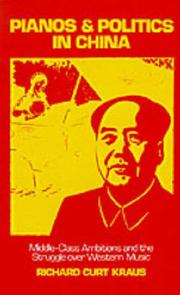
ISBN: 0195058364 Year: 1989 Publisher: Oxford Oxford University Press
Abstract | Keywords | Export | Availability | Bookmark
 Loading...
Loading...Choose an application
- Reference Manager
- EndNote
- RefWorks (Direct export to RefWorks)
S06/0436 --- Music and state --- -Musicians --- -Music --- -Art music --- Art music, Western --- Classical music --- Musical compositions --- Musical works --- Serious music --- Western art music --- Western music (Western countries) --- Artists --- State and music --- Cultural policy --- Music --- China: Politics and government--Policy towards literature and art --- Biography --- Political aspects --- -Social aspects --- China --- Cultural policy. --- Musicians --- Art music --- Social aspects --- 78.33.7 --- History
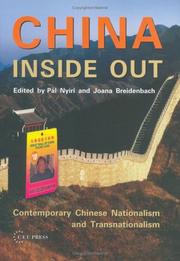
ISBN: 9786155053962 6155053960 2821815034 1281268763 9786611268763 1423718208 9781423718208 9781281268761 9789639241954 9639241954 9789637326141 9637326146 9782821815032 6611268766 Year: 2005 Publisher: Budapest, Hungary ; New York, N.Y. : Central European University Press,
Abstract | Keywords | Export | Availability | Bookmark
 Loading...
Loading...Choose an application
- Reference Manager
- EndNote
- RefWorks (Direct export to RefWorks)
The "war on terror" has generated a scramble for expertise on Islamic or Asian "culture" and revived support for area studies, but it has done so at the cost of reviving the kinds of dangerous generalizations that area studies have rightly been accused of. This book provides a much-needed perspective on area studies, a perspective that is attentive to both manifestations of "traditional culture" and the new global relationships in which they are being played out. The authors shake off the shackles of the orientalist legacy but retain a close reading of local processes. They challenge the boundaries of China and question its study from different perspectives, but believe that area studies have a role to play if their geographies are studied according to certain common problems.In the case of China, the book shows the diverse array of critical but solidly grounded research approaches that can be used in studying a society. Its approach neither trivializes nor dismisses the elusive effects of culture, and it pays attention to both the state and the multiplicity of voices that challenge it.
Nationalism --- China --- Foreign relations --- S02/0200 --- S06/0240 --- S11/1100 --- China: General works--Civilization and culture --- China: Politics and government--Policy towards minorities and autonomous regions --- China: Social sciences--Immigration and emigration, Overseas Chinese (huaqiao) --- 21st century, China, Empires, Foreign relations, Modernity, Nationalism, Racism Russia.
Book
ISBN: 9781844643394 9781844643790 1844643794 1844643395 Year: 2017 Publisher: [Place of publication not identified]
Abstract | Keywords | Export | Availability | Bookmark
 Loading...
Loading...Choose an application
- Reference Manager
- EndNote
- RefWorks (Direct export to RefWorks)
S11/1450 --- S06/0438 --- S01/0600 --- China: Social sciences--Journalism and the press --- China: Politics and government--Policy towards press, Internet --- China: Bibliography and reference--Books, printing, editing and paper --- Government and the press --- Press --- Press and government --- Press policy --- State and the press --- Freedom of the press --- Press and politics --- History --- Government policy --- Da gong bao
| Listing 1 - 10 of 34 | << page >> |
Sort by
|

 Search
Search Feedback
Feedback About UniCat
About UniCat  Help
Help News
News